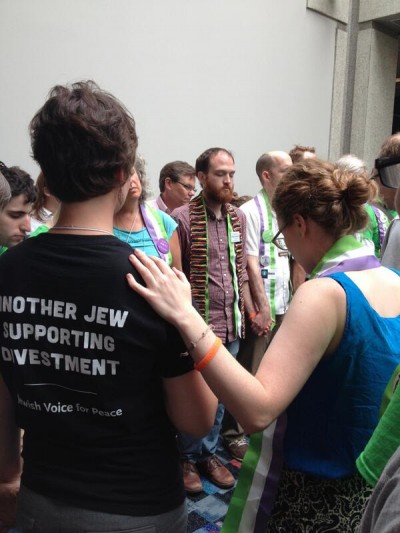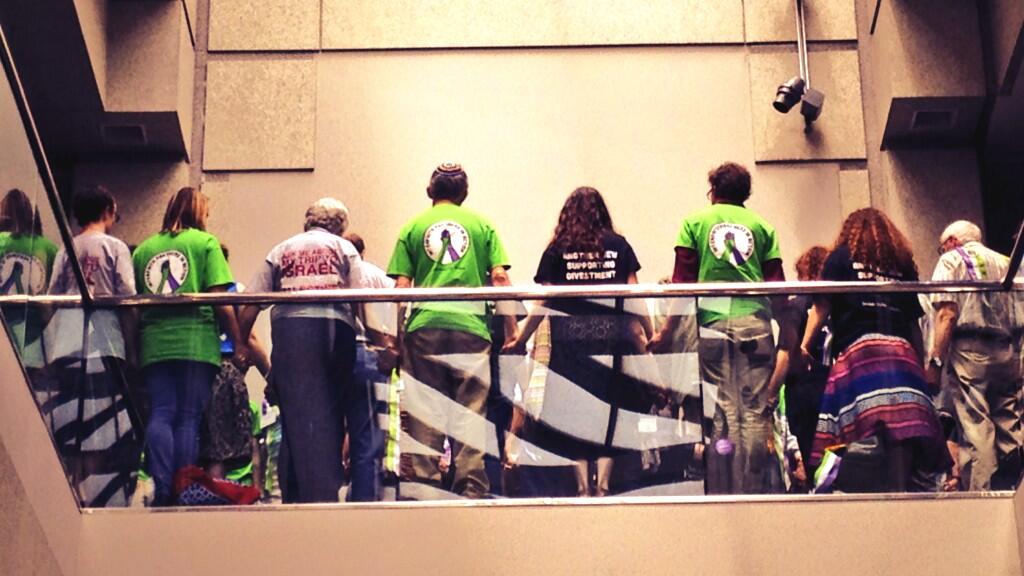
Witnessing the first day of the Presbyterian General Assembly has been both empowering and dismaying. I am glad to have been part of an effective coalition of Jews, Presbyterians, and Palestinians, and Muslims coming together to support the Presbyterian Church’s effort to divest from Caterpillar, Hewlett-Packard, and Motorola. But I’m dismayed by the opposition’s claim that the divestment resolution undermines the two-state solution. I disagree. Divestment, called for by 170 Palestinian organizations representing a wide swathe of Palestinian society, is the only action that can create a viable two-state solution.
The specific actions of these corporations stand directly in the way of building a viable Palestinian state. Caterpillar bulldozers demolish Palestinian homes and have uprooted tens of thousands of fruit-bearing trees. There are currently up to 20,000 demolition orders in East Jerusalem. Caterpillar is the instrument of demolition. Motorola Solutions provides technology to illegal Israeli settlements and the heavily militarized Gaza border. Hewlett-Packard supports the segregation of Palestinians living in the West Bank and East Jerusalem by providing separate biometric ID systems. Contrary to what the opposition may claim, these divestment resolutions have nothing to do with Israel’s “existence.” Rather, divestment targets the infrastructure of the occupation and the capacity of the Israeli military to maintain control over the daily lives of Palestinians living under occupation.
Divestment opponents claim that the one-state solution is a “secret recipe to destroy Israel.” The current reality on the ground, however, is a one state solution. Despite limited Palestinian autonomy in less than 38% of the West Bank, Israel controls over 60% of the area, as well as Palestinian movement in and outside of the West Bank, exports and imports from the West Bank, ultimately holding sovereignty over all Palestinian territory via military and civilian control. Policies of home demolition, land confiscation, and settlement expansion cut up the land designated for a future Palestinian state, making the West Bank look more and more like a piece of Swiss cheese. In addition, Gaza is under total lockdown. Despite Israeli claims that the need for security justifies the siege of the Gaza Strip, the restrictions extend far beyond security. Israel limits the amount of food entering the Strip as well as crucial medicine and construction materials that are badly needed. By maintaining control over Gaza and confiscating land in the West Bank, Israel makes the creation of a viable Palestinian state impossible.
Jewish individuals and organizations opposing divestment, including the self-described pro-Israel, pro-peace lobby J Street, claim to support a two-state solution, even going so far as to demand that the US pressure Israel to halt settlement construction. And yet, they oppose any form of direct action, such as divestment, which many regard as the only viable form of leverage. In the face of failed North American leadership to create a just solution, those who oppose divestment, are undermining tactics that are, in fact, pressuring Israel to seriously consider a two-state solution. If J Street is dedicated to a two-state solution and genuinely wishes to end the occupation, I urge it to re-consider its opposition to divestment. I call on J Street and other opponents of divestment to remember that the vast majority of Palestinian civil society supports divestment as a viable, non-violent means to leverage power. Tens of thousands of people who care about the safety and security of both Israelis and Palestinians agree, as church and campus divestment is expanding day by day.
As a former member of J Street U, I joined the organization because I believed that it offered a middle ground between the BDS movement and AIPAC, which is closely aligned with Israel’s right-wing government. I helped establish the first J Street U chapter at the University of Washington. I believed I was pursuing the best option to realize peace. I no longer believe this to be the case. Therefore, I have decided to join those in the Jewish community who will take meaningful, concrete steps to achieve a just solution to the conflict.
I’m not writing this to implore J Street to support divestment. I’m asking that J Street stop interfering with the work of those who are acting in solidarity with the Palestinian call for divestment. I am asking J Street to take stronger action to materially pressure Israel to allow for the creation of a sovereign Palestinian state. I am asking for a broad tent and a conversation more open to all of us who disagree on the tactics we use to pursue peace. J Street’s strategy of lobbying the United States in pursuit of a negotiated 2-state solution seems to have failed. I simply ask: what now will you do to change the status quo? I support divestment because it has the power to force Israel to look itself in the mirror.
“First they ignore you, then they laugh at you, then they fight you, then you win.”-Gandhi
Aaron Lerner recently graduated from the University of Washington.

